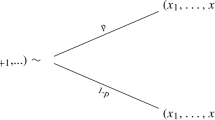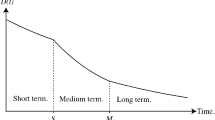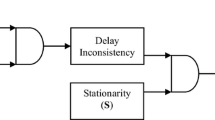Abstract
This article builds an axiomatization of inter-temporal trade-offs that takes an explicit account of the distant future. The focus is on separable representations and the approach is completed following a decision-theory index based approach that is applied to utility streams understood as the well-being of future generations. The introduction of some new axioms is herein shown to lead to the emergence of two distinct orders that respectively relate to the distant future and close future components of some utility stream. This enlightens the limits of the commonly used fat tail intensity requisites for the evaluation of utility streams. These are replaced by an axiomatic approach to myopia degrees.
Similar content being viewed by others
References
Asheim, G.B., Ekeland, I.: Resource conservation across generations in a Ramsey–Chichilnisky model. Econ. Theor. 61, 611–639 (2016)
Asheim, G.B., Mitra, T., Tungodden, B.: Sustainable recursive social welfare functions. Econ. Theory 49, 267–292 (2012)
Ayong Le Kama, A., Ha-Huy, T., Le Van, C., Schubert, K.: A never-decisive and anonymous criterion for optimal growth models. Econ. Theory 55, 281–306 (2014)
Araujo, A.: Lack of pareto optimal allocation in economies with finitely many commodities: the need of impatience. Econometrica 53, 455–461 (1985)
Bastianello, L.: A topological approach to delay aversion. J. Math. Econ. 73, 1–12 (2017)
Bastianello, L., Chateauneuf, A.: About Delay Aversion. J. Math. Econ. 63, 62–77 (2016)
Basu, K., Mitra, T.: Aggregating infinite utility streams with intergenerational equity: the impossibility of being paretian. Econometrica 71, 1557–1563 (2003)
Basu, K., Mitra, T.: Utilitarianism for infinite utility streams: a new welfare criterion and its axiomatic characterization. J. Econ. Theory 133, 350–373 (2007)
Becker, R.A., Boyd, J.H.: Capital Theory, Equilibrium Analysis an Recursive Utility. Blackwell, Oxford (1997)
Bewley, T.F.: Existence of equilibria in economies with infinitely many commodities. J. Econ. Theory 4, 521–540 (1972)
Brown, D., Lewis, L.: Myopic economic agents. Econometrica 49, 359–368 (1981)
Chichilnisky, G.: An axiomatic approach to sustainable development. Soc. Choice Welfare 13, 231–257 (1996)
Chichilnisky, G.: What is sustainable development? Land Econ. 73, 467–491 (1997)
Chambers, C., Echenique, F.: On multiple discount rates. Econometrica 86, 1325–1346 (2018)
Diamond, P.A.: The evaluation of infinite utility streams. Econometrica 33, 170–177 (1965)
Figuières, C., Tidball, M.: Sustainable exploitation of a natural resource: a satisfying use of Chichilnisky’s criterion. Econ. Theor. 49, 243–265 (2012)
Gabaix, X., Laibson, D.: Myopia & Discounting. Working paper (2017)
Ghirardato, P., Maccheroni, F., Marinacci, M.: Differentiating ambiguity and ambiguity attitude. J. Econ. Theory 118, 133–173 (2004)
Gilboa, I., Schmeidler, D.: Maximin expected utility with non-unique prior. J. Math. Econ. 18, 141–153 (1989)
Heal, G.: Valuing the Future, Economic Theory and Sustainability. Columbia University Press, New York (1998)
Koopmans, T.J.: Stationary ordinal utility and impatience. Econometrica 28, 287–309 (1960)
Lapied, A., Renault, O.: How do People Discount the Very Distant Future? Working Paper (2013)
Marinacci, M.: An axiomatic approach to complete patience and time invariance. J. Econ. Theory 83, 105–144 (1998)
Phelps, P., Pollack, R.: On second-best national saving and game-equilibrium growth. Rev. Econ. Stud. 35, 185–199 (1968)
Rawls, J.: A Theory of Justice. Clarendon, Oxford (1971)
Sawyer, C.: Stationary Recursive Preferences: Myopia and Impatience Reconsidered—The Many Goods Case, Working Paper (1988)
Wakai, T.: A Model of Utility Smoothing. Econometrica 73, 157–63 (2007)
Zuber, S., Asheim, G.B.: Justifying social discounting: the rank-discounted utilitarian approach. J. Econ. Theory 147, 1572–1601 (2012)
Author information
Authors and Affiliations
Corresponding author
Additional information
Publisher's Note
Springer Nature remains neutral with regard to jurisdictional claims in published maps and institutional affiliations.
Earlier versions of this study were presented at the SAET 2017 and PET 2017 conferences, at a workshop in Firenze, at the internal seminar of the Warsaw School of Economics and at the Time, Uncertainties and Strategies IV conference in Paris. A more recent version was presented at the \(\hbox {VII}^{th}\) Hurwicz Conference on Mechanism Design in Warsaw. The authors would like to thank Gaetano Bloise, Alain Chateauneuf, Rose-Anne Dana, Joanna Franaszek and Jan Werner for their insightful comments on these occasions. Detailed remarks from two anonymous referees and the editor, all of them being thanked for their patience in the completion of the revised version, were also helpful in clarifying the contents of the article. Thai Ha-Huy would like to thank the Labex MME-DII (ANR-11-LBX-0023-01) for its support during the completion of this article. This article was completed during the time Thai Ha-Huy worked as délégué at the Theoretical Economics team UMR 8545 of the CNRS, Paris School of Economics (Campus Jourdan). He acknowledges the members of PSE and the CNRS for the warm welcome and the excellent working conditions.
Rights and permissions
About this article
Cite this article
Drugeon, JP., Ha Huy, T. A not so myopic axiomatization of discounting. Econ Theory 73, 349–376 (2022). https://doi.org/10.1007/s00199-020-01336-3
Received:
Accepted:
Published:
Issue Date:
DOI: https://doi.org/10.1007/s00199-020-01336-3




